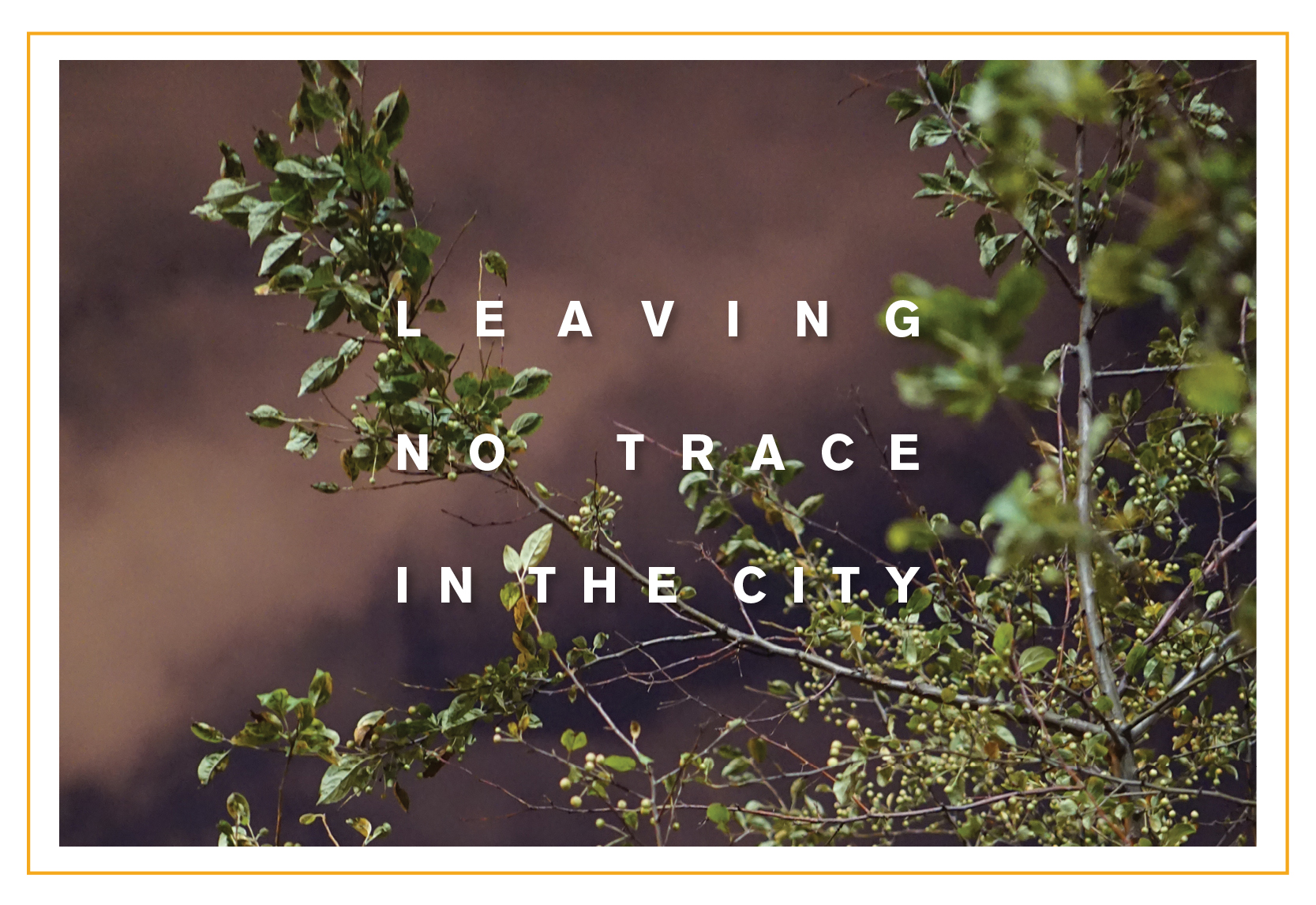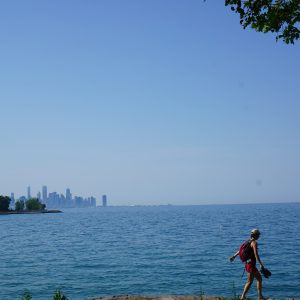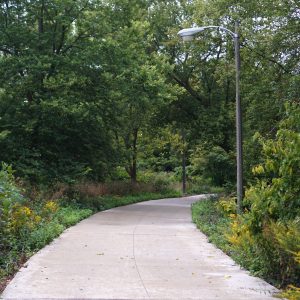I live in a big city. My Chicago apartment sits perched on the second floor, parallel to power lines and arched street lights that switch on at the first sign of dusk. From my living room every day, I watch rush hour swell and construction workers drill. I hear the squeaky brakes of the city bus and the rumbling echo of the elevated train line. Life on my block is often loud, hectic and dirty. But it can also be quiet and gentle. Over the years, I’ve come to mark the passing of the seasons using the bird calls that warble in the urban tree canopy. During regular hikes around my neighborhood, I’ve learned the names and locations of native plants, recognizing the rattle of their seed pods in an autumn wind, the shape of their winter skeleton branches, the scent of their spring flowers, and the perfect, vibrant summer green of their foliage.
I’ve always deeply loved the outdoors and my choice to live in a city has never gotten in the way of that. I chose the city because my community and my work are here. Living in the city has challenged and tested me, but it’s also opened me up and made me who I am. I want to remain considerate of a place that has given me so much. As an Earth-minded city dweller, I’ve developed a few guidelines over the years to help me stay observant and compassionate with the lightest footprint possible.
You may be familiar with the seven Leave No Trace Principles, which have helped outdoor enthusiasts recreate in nature responsibly since the 1960s as a set of standards to minimize human impact on the outdoors. City dwellers can also use the principles to move through our streets more thoughtfully and sustainably with more consideration for both our human and non-human neighbors. We may not live in protected nature preserves, but our cities deserve respect and consideration. May we all keep these principles in mind as we travel through the world, whether it’s on dusty trails or sparkling city sidewalks.
Plan Ahead and Prepare
Think about the impact of your choices, buy less and bring what you need.
Urban life is a convenient life. Every option is at our fingertips and anything we could possibly want can be acquired immediately or delivered to our door within hours. Fast food and fast fashion in shopping districts battle for our attention and dollars, but the personal and global consequences of these bargains are glossed over and quickly forgotten. Every choice we make, from the food we put in our bodies to the products we buy, has an impact. Do your research. Buy from fair trade sources. Support companies with sustainable and transparent supply chains. DIY instead. Share, borrow and lend.
Avoiding single-use plastics is crucial and gets easier with practice. Buy in store instead of online whenever you can. Dine in to avoid takeout pack- aging. I never leave home without my collapsible tote bag. Consider bringing a small dining kit with you and keep one in your office or car. A sample kit could include a stainless steel water bottle, small insulated thermos or double walled cup, glass tupperware, bamboo utensils and a cloth napkin.
Travel on Durable Surfaces
Reduce our effects on the environment by sticking to well-trodden areas.
While traveling in the wild, it’s important to stay on the trail. In the city, use main arterial streets and seek out public transportation and carpools. Moving in packs means the carbon impact of your travel will be shared and distributed between all passengers.
If you’re lucky enough to have forest preserves or protected natural habitats in or near your city, enjoy the area the way urban planners and park designers intended. Don’t take shortcuts through sensitive vegetation and don’t hop fences or trespass on private property to get better views.
Dispose of Waste Properly
Take responsibility for the waste you make or don’t generate it at all.
The less you consume, the less you’ll need to throw away. The best way to get rid of garbage is not making any in the first place. Use, fix and reuse household and personal items. Research where your donated items will actually end up. Opt for food with little to no packaging like fresh fruits and vegetables. Purchase pantry items in bulk using your own bags and canisters.
I’ve been known to carry recyclables around with me for hours until finding a proper place to dispose of them. Bringing your reusable bottle with you is ideal when you’re outside of the house, but if you need to dispose of something, always do so responsibly. If you can recycle an item, never put it in the garbage.
Compost as much of your organic food waste as possible. Use compost bins if your city provides them. Research compost drop-offs at your local farmers market or food co-op. Join forces with neighbors or friends to create community compost piles in your backyards.
Leave What You Find
The beauty of the city belongs to all of us. Love the place you live.
Just as you would in the backcountry, leave the environment as you found it. No wildflower picking or leaf yanking. No carving initials into tree trunks or building graffiti.
Leave your mark in other ways. Record your experiences in urban nature. Invite others to join you on long walks. Share a community garden plot with a friend. Teach a child the name of the weed growing beside their front stoop. Tell your story and the stories of the folks who came before you.
Minimize Energy Use
Be thoughtful considering where your energy comes from and where it goes. Treat as the precious resource it is.
Outside cities, this principle applies to responsible fire practices, but at home, it’s likely you’ll be flipping a switch rather than lighting a match. Remember all energy comes from somewhere and has an environmental impact, which you can mitigate by using renewable energy sources. Look into the options in your area and how they vary whether you rent or own your home.
Be conscious of how much energy you use and reduce your consumption. Turn lights off when you leave a room. Unplug unused electronics. Keep thermostats lower in winter and higher in summer, or pile on the blankets when it’s cold and carry a hand fan when it’s hot.
Disconnect from the grid regularly. Turn off your phone, open your eyes, and go for a walk around the block.
Respect Wildlife
You have a lot more neighbors than you think. This is their home, too.
Learn about the plants and animals in your area. Welcome and admire them. Learn their habits and patterns. Give them space to grow and thrive.
Create places for migrating birds and butterflies to stop along their journey. Plant milkweed in a sunny spot. Line vegetable plots with flowers to sustain bees and other pollinators.
You may think you live in a concrete grid, but there is an entire ecosystem expanding and contracting around you every day. Remember you’re a single member of one species in your environment. Be a gracious guest.
Be Considerate of Other Visitors
Think about how your actions affect others. Love the people in your city as much as you love the city itself.
Never litter. If you see any litter, even if it isn’t on your street or in your neighborhood, pick it up. Step up and share the responsibility for maintain- ing the beauty of our public spaces.
Slow down. Say hello. Hold the door for the person behind you. Help a stranger. Support a friend of a friend. Participate in another culture. Acknowledge and celebrate differences. Be kind and curious. Every day, we make our cities what they are with every choice we make. Help make your city a place you’re proud to live in by becoming the neighbor you’d be proud to have.
Recognize the part you play, but be gentle with yourself. Keep these guidelines in mind as you move through your daily city life, but acknowledge you’re doing your best. If we all share these responsibilities, we can build vibrant and fulfilling lives, whether we’re traversing an urban landscape, backpacking deep in the wild, or any- where in between.
Images courtesy of Simone Martin-Newberry.
This article was originally published in RANGE Magazine Issue Nine.



